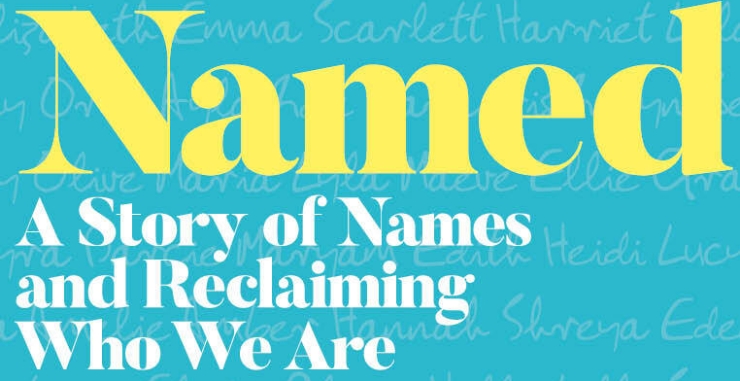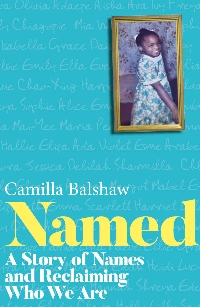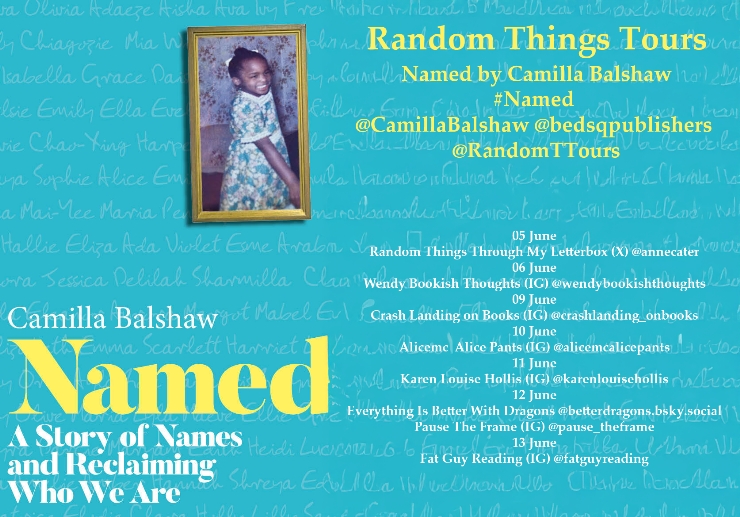Blog tour: Named: A Story of Names and Reclaiming Who We Are by Camilla Balshaw

This post is part of a blog tour organised by Random Things Blog Tours. I received a free copy of the book in return for an honest review.
‘Our names are a shadow we carry around with us. They are part of who we are. Our names are a marker of our self-identity and our sense of self.
‘Our names have the power to shock. They have the power to heal, and they have the power to trigger conversations around race, class, social mobility and belonging.
‘But what is a name? What do our names tell us about ourselves? And why do they matter?
‘Named is an exploration of names, global naming conventions and identity politics woven into a moving, personal narrative about the finding of family and self.’

When she was ten years old, Camilla Balshaw, née Sanni, found her birth certificate, and learned her “official” name was not Amanda, as everyone had always called her. Named is about her on-and-off quest to go by her registered name, Camilla; her relationship – or lack thereof – with the long-absent father who named her; and the use and meaning of names in her family and society more generally.
I absolutely flew through Named. The author shares her life story in a lively and spirited, yet intimate-feeling way that really engaged me, and her broader exploration of what names signify is interesting and thought-provoking.
Balshaw has an uncommon combination of backgrounds: her Jamaican mother and Nigerian father met in London in the 1960s. It was unusual for the two ethnic groups to mix socially, let alone marry and have children, and after her parents divorced and her father went back to Nigeria when she was a young child, Balshaw and her two siblings’ loyalties lay firmly with their mother. For this reason, they favoured their Jamaican roots and were discouraged from taking any interest in their Nigerian heritage, with their estranged father being referred to as Sanni (his – and their – surname), or even The Nigerian.
Named switches between illustrative episodes from throughout Balshaw’s life, and 2015-17, when an out-of-the-blue phone call from a cousin led to her first contact with her father in 40+ years, and opportunities to get to know other members of her Nigerian family.
Naturally, you go through an emotional wringer with Balshaw, as she deals with indecision and feelings of disloyalty, disappointment, and loss, but also some degree of resolution. In the narratives from earlier in her life, we additionally learn that Balshaw’s mother had a traumatic childhood she doesn’t like to talk about, and that Balshaw couldn’t have children due to severe endometriosis.
While, therefore, a fair bit of her material is dark, Balshaw is adept at surfacing the humour in almost any situation, from the reason she came across her birth certificate in the first place; to her awkwardness when she first met her cousin in person; to her mother’s literal answers to questions, deflective non-sequiturs, and blatant hypocrisy. I literally snorted at Balshaw’s comments on a yoga workshop she once attended (as well as a writer, she is a yoga teacher).
What’s more, some of the scenes from Balshaw’s childhood are really entertaining and relateable (the absolute dreariness of Sunday afternoons when everywhere was shut! Playing at being popstars with your best friend and deciding what you’d call all the babies you were going to have when you grew up!), and I found it exciting to read about the years she spent living and working in Japan.
As Balshaw herself quickly discovered when she started telling people she was writing this book, names are a subject that piques everyone’s interest, because our names, and the stories of how they came to be, are attached to us so soon after, or even before birth, and therefore define us for better or for worse.
Our names are so integral to our lives, having one you hate can feel like having a wound reopened several times every day, while changing your name to one you prefer can help bring your inner and outer selves into alignment. Just hearing or seeing the name of someone we’re yet to meet sparks ideas of who they are and what they might look like, however hard we try to keep an open mind.
Accordingly, I felt a particular swell of recognition when I read about families altering their surnames to assimilate in a new country (hi), and parents being inspired by the names of actors/characters on TV around the time they had their children (hi, again) – and who among us hasn’t come across a child whose name has unfortunate connotations, or an unprecedented spelling?
There were a couple of areas where I’d have liked to have seen a little more depth. While Balshaw herself wearily accepts that certain relatives will always call her Amanda/Mandy no matter how often she corrects them, it’s important to point out that, for trans people and abuse survivors especially, deadnaming signals a lack of respect and acceptance, and can be triggering. It would also have been interesting to find out whether children named after certain relatives/characteristics feel pressured (externally or internally) to embody the qualities their name represents.
Named is an entertaining, fascinating, and stirring blend of memoir and social sciences.
